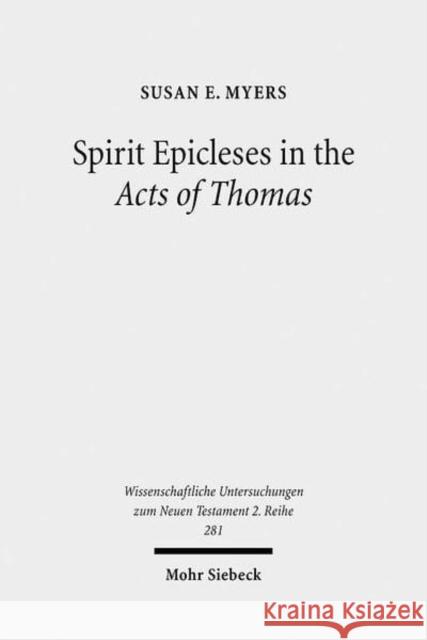Spirit Epicleses in the Acts of Thomas » książka
Spirit Epicleses in the Acts of Thomas
ISBN-13: 9783161494727 / Angielski / Miękka / 2010 / 268 str.
The most complete example of an early Christian novel about an historical figure, the third-century Acts of Thomas contains within it two prayers that are strikingly similar in style and content. Each is found in the context of Christian initiation and each is addressed to a feminine deity who is asked to come to be present in the ritual. The prayers address the feminine Spirit, who is called Mother, fellowship of the male, and dove, among other titles. Susan E. Myers examines these prayers in their historical, literary, and liturgical contexts, and challenges some of the prevailing assumptions about Syriac-speaking Christianity in general, and the Acts of Thomas in particular.She extensively analyzes the Acts of Thomas, beginning with questions of authorship, provenance, and dating of the work. At the core of the study is a detailed analysis of the redactional character of the Acts of Thomas, especially the prayer language within it. The author argues that the liturgical scenes reveal a form of Christian initiation that apparently included an anointing with optional water baptism, and a Eucharist of bread and water only.Susan E. Myers continues by examining other prayers to deities in the ancient world, and concludes with an analysis of the theological content of the prayers themselves. They are addressed to the Spirit, who appears as a feminine revealer figure who can be invoked to be present in ritual action with her devotees.
Susan E. Myers concentrates on two prayers, strikingly similar in style and content, found in the third-century Acts of Thomas. Each prayer is located in the context of Christian initiation and each is addressed to a feminine deity who is asked to "come" to be present in the ritual. The prayers appeal to the feminine Spirit, who is called "Mother," "fellowship of the male," and "dove," among other titles. The author examines these prayers in their historical, literary, and liturgical contexts, challenging some of the prevailing assumptions about Syriac-speaking Christianity in general, and the Acts of Thomas in particular.











